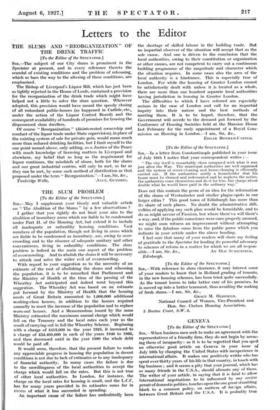THE SLUM PROBLEM .
[To the Editor of the SPECTATOR.]
Sin,—May I, supplement your timely and valuable article on '-.The Abolition of the Slums " by a few observations ?
11 gather that you rightly do not limit your aim to the abolition of insanitary areas which are liable to be condemned under Part II. of the Housing Act, but extend it to include all inadequate or unhealthy housing conditions. Vast numbers of the population, though not living in areas which are liable to be condemned as insanitary, are, owing to over- crowding and to the absence of adequate sanitary and other conveniences, living in unhealthy conditions. The slum problem is indeed in the main one aspect of the problem of overcrowding. And to abolish the slums it will be necessary to attack and solve the wider evil of overcrowding.
With regard to your suggestion as to the necessity of an estimate of the cost of abolishing the slums and rehousing the population, it is to be remarked that Parliament and the Ministry of Health at the time of the passing of the Wheatley Act anticipated and indeed went beyond this suggestion. The Wheatley Act was based on an estimate put forward by the Ministry of Health that the housing needs of Great Britain amounted to 1,000,000 additional working-class houses, in addition to the houses required annually to meet the increase of the populatibn and to replace worn-out houses. And a Memorandum issued by the same Ministry estimated the maximum annual charge which would fall on the Treasury and the local rates each year as the result of carrying out in full the Wheatley Scheme. Beginning with a charge of £413,000 in the year 1925, it increased to it charge of 234,400,000 in each of the years 1940 to 1968, and then decreased until in the year 1980 the whole debt would be paid off.
It would seem, therefore, that the present failure to make any appreciable progress in housing the population in decent conditions is not due to lack of estimates or to any inadequacy of financial authority. In many cases the failure is due to the unwillingness of the local authorities to accept the charge which would fall on the rates. But this is not true of other local authorities. In London, for instance, the charge on the local rates for housing is small, and the L.C.C. has for many years provided in its estimates sums far in excess of what it has succeeded in spending.
An_ important cause of the failure has undoubtedly been
the shortage of skilled labour in the building trade. But no impartial observer of the situation will accept that as the sole cause. And one is driven to the conclusion that the local authorities, owing to their constitution or organization or other causes, are not competent to carry out a continuous building programme of the magnitude and character which the situation requires. In some cases also the area of the local authority is a hindrance. This is especially true of London. For while the housing of Greater London cannot be satisfactorily dealt with unless it , is treated as a whole, there are more than one hundred separate local authorities having jurisdiction in housing in Greater London.
The difficulties to which I have referred are especially serious in the case of London and call for an impartial inquiry into their nature and the best methods of meeting them. It is to be hoped, therefore, that the Government will accede to the demand put forward by the Conference of Housing Societies held at the Mansion House last February for the early appointment of a Royal Com- mission on Housing in London.—I am, Sir, &c.,
EDGAR BONHAM-CARTER.






































 Previous page
Previous page